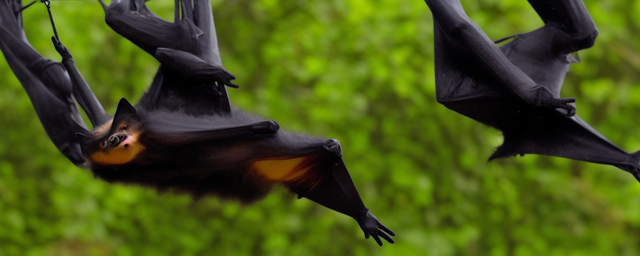
黑线飞狐的危害
原|2024-04-25 19:21:47|浏览:33
The Black Flying Fox, also known as the black flying-fox or black fruit bat, is a species of megabat native to Australia. While these bats play a crucial role in pollination and seed dispersal, they can also pose certain risks and hazards to humans and the environment.
One of the main concerns regarding the Black Flying Fox is its potential to spread diseases. These bats can carry various viruses, including Australian bat lyssavirus and Hendra virus, which can be transmitted to humans through scratches or bites. These viruses can cause serious illnesses and even death in some cases, making it important to avoid direct contact with these bats.
Additionally, the large colonies of Black Flying Foxes can create issues in urban areas. Their droppings can accumulate and create unsanitary conditions, leading to potential health hazards. The noise and smell from these colonies can also be disruptive to nearby residents, impacting their quality of life.
Furthermore, the feeding habits of Black Flying Foxes can sometimes result in damage to fruit crops, particularly in orchards and vineyards. This can lead to financial losses for farmers and agricultural producers, as well as potential conflicts between humans and wildlife.
Conservation efforts are often needed to manage the population of Black Flying Foxes and mitigate the risks they pose. This can involve measures such as habitat protection, relocation of colonies, and public education on how to coexist safely with these bats.
In conclusion, while Black Flying Foxes play a vital role in the ecosystem, their presence can also bring about certain challenges and dangers. It is important to address these issues through proper management and conservation strategies to ensure the well-being of both humans and the environment.
猜你喜欢
- 茶的分类及代表品种
- 六大茶类的代表名茶分别有
- 茶的类型和代表
- 六大茶叶的分类及产地
- 庙的分类及代表
- 藻的分类及其代表
- 茶的分类及代表茶品特点
- 茶的分类及代表茶
- 简述茶类的分类及其代表性名茶
- 六大茶类的分类及代表茶
- 动物分类及代表
- 糖的分类及代表
- 茶的分类及代表茶叶
- 茶的分类及代表图
- 茶的分类及代表作
- 茶器按质地的分类及代表茶器
- 茶的分类及代表名茶教学设计
- 简述茶的分类及代表性名茶
- 请写出乌龙茶的分类及代表茶
- 法国雅文邑白兰地系列
- 雅文邑白兰地介绍
- 1952年法国雅文邑白兰地
- 法国雅玛邑白兰地
- 纽波利顿獒
- 法国犬品种
- 南非獒犬的优缺点
- 波尔多獒犬寿命
- 波兰狩猎犬
- 波尔多犬和罗威纳犬对比
- 波尔多犬和杜高对比
- 世界十大凶犬
- 护卫犬排行榜前十名
- 大红袍怎么泡效果好
- 大红袍怎么泡不开
- 大红袍怎么泡茶
- 大红袍怎么泡出来没颜色
- 大红袍怎么泡不苦
- 大红袍怎么泡多久
- 大红袍怎么泡才正确的特点
- 大红袍怎么泡没有柴味儿
- 大红袍怎么泡放多少合适
- 花香大红袍怎么泡
- 大红袍怎么泡茶好
- 大红袍是怎么泡的
- 大红袍怎么泡水好喝
- 大红袍用玻璃杯怎么泡
- 大红袍怎么泡味道浓一些
- 十大排名果花茶
- 十大花茶组合排名
- 十大花茶品种大全
- 十大花茶功效
- 十大花茶销量排行榜
- 十大花茶有哪些
- 十大花茶品种
- 十大花茶推荐
- 十大花卉排行榜
- 十大花卉
- 十大花茶调理内分泌
- 九五至尊秦昊明月关山
- 红茶冲泡工艺
为你推荐






































































